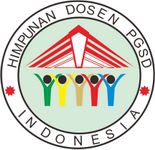Implementasi Media Pembelajaran Robokids Berbasis STEAM Untuk Meningkatkan Minat Belajar Dan Prestasi Belajar Siswa Sekolah Dasar
DOI:
https://doi.org/10.31949/jee.v6i3.6094Abstract
The background of this research is the lack of interest in learning and student learning achievement, the lack of use of STEAM-based learning media in learning so that learning is less interesting so that it affects student learning interest. This study aims to describe how interest in learning and learning achievement of elementary school students is influenced by STEAM-based robokid learning media. One group pretest-posttest design is used in this type of quantitative descriptive research. In this study, questionnaires, interviews, and observations were used to collect data. In this research using data analysis techniques in the form of Paired samples t-test and N-gain score test. In the paired samples t-test, the results of data analysis of learning interest and learning achievement show sig. (2-tailed) 0.000 <0.05. Interest in learning gets an average N-Gain Score of 0.7014 on the N-Gain Score test, while learning achievement gets an average N-Gain Score of 0.4029. It was concluded that STEAM-based robokid learning media can improve the learning achievement of elementary and high school students. So that robokids learning media can be used by teachers in learning.
Keywords:
STEAM, Minat Belajar, Prestasi Belajar, Keterampilan membaca, RobokidsDownloads
References
Anggraeni, B. (2015). Pengaruh Pengetahuan Kewirausahaan Dan Lingkungan Keluarga Terhadap Minat Berwirausaha Siswa Kelas Xi Smk Islam Nusantara Comal Kabupaten Pemalang. X(1), 42–52.
Arsy, I., & Syamsulrizal, S. (2021). PENGARUH PEMBELAJARAN STEAM (Science, Technology, Engineering, Arts, and Mathematics) TERHADAP KREATIVITAS PESERTA DIDIK. Biolearning Journal, 8(1), 24–26. https://doi.org/10.36232/jurnalbiolearning.v8i1.1019
Astuti, S. P. (2015). Pengaruh Kemampuan Awal dan Minat Belajar terhadap Prestasi Belajar Fisika. Formatif: Jurnal Ilmiah Pendidikan MIPA, 5(1), 68–75. https://doi.org/10.30998/formatif.v5i1.167
Charli, L., Ariani, T., & Asmara, L. (2019). Hubungan Minat Belajar terhadap Prestasi Belajar Fisika. Science and Physics Education Journal (SPEJ), 2(2), 52–60. https://doi.org/10.31539/spej.v2i2.727
Darmawati, J. (2017). Pengaruh Motivasi Belajar Dan Gaya Belajar Terhadap Prestasi Belajar Ekonomi Siswa Sma Negeri Di Kota Tuban. Jurnal Ekonomi Pendidikan Dan Kewirausahaan, 1(1), 79. https://doi.org/10.26740/jepk.v1n1.p79-90
Duban, Aydogdu, K. (2018). STEAM implementations for Elementary School Students in Turkey. Peer-Assisted Learning, 3(2), 41–58.
Friantini, R. N., & Winata, R. (2019). Analisis Minat Belajar pada Pembelajaran Matematika. JPMI (Jurnal Pendidikan Matematika Indonesia), 4(1), 6. https://doi.org/10.26737/jpmi.v4i1.870
Kim, M. K., Lee, J. Y., Yang, H., Lee, J., Jang, J. N., & Kim, S. J. (2019). Analysis of elementary school teachers’ perceptions of mathematics-focused STEAM education in Korea. Eurasia Journal of Mathematics, Science and Technology Education, 15(9), 1–13. https://doi.org/10.29333/ejmste/108482
Mu’minah, I. H., & Suryaningsih, Y.-. (2020). Implementasi Steam (Science, Technology, Engineering, Art and Mathematics) Dalam Pembelajaran Abad 21. BIO EDUCATIO : (The Journal of Science and Biology Education), 5(1), 65–73. https://doi.org/10.31949/be.v5i1.2105
Munawar, M., Roshayanti, F., & Sugiyanti. (2020). STEAM-Based Learning Through Magnetic Book: Efforts to Introduce Science Inquiry for Early Children. 417(Icesre 2019), 167–170. https://doi.org/10.2991/assehr.k.200318.032
Novita, L., Sukmanasa, E., & Pratama, M. Y. (2019). Penggunaan Media Pembelajaran Video terhadap Hasil Belajar Siswa SD. Indonesian Journal of Primary Education, 3(2), 64–72. https://doi.org/10.17509/ijpe.v3i2.22103
Oktiani, I. (2017). Kreativitas Guru dalam Meningkatkan Motivasi Belajar Peserta Didik. Jurnal Kependidikan, 5(2), 216–232. https://doi.org/10.24090/jk.v5i2.1939
Pendidikan, M., & Teknologi, D. A. N. (2022). Kepmendikudristek Nomor 262/M/2022 tentang Perubahan Pemulihan Pembelajaran.
Ricardo, R., & Meilani, R. I. (2017). Impak Minat dan Motivasi Belajar Terhadap Hasil Belajar Siswa. Jurnal Pendidikan Manajemen Perkantoran, 2(2), 79. https://doi.org/10.17509/jpm.v2i2.8108
Syafi’i, A., Marfiyanto, T., & Rodiyah, S. K. (2018). Studi Tentang Prestasi Belajar Siswa Dalam Berbagai Aspek Dan Faktor Yang Mempengaruhi. Jurnal Komunikasi Pendidikan, 2(2), 115. https://doi.org/10.32585/jkp.v2i2.114
Tafonao, T. (2018). Peranan Media Pembelajaran Dalam Meningkatkan Minat Belajar Mahasiswa. Jurnal Komunikasi Pendidikan, 2(2), 103. https://doi.org/10.32585/jkp.v2i2.113
Umar, M. (2015). Peranan Orang Tua Dalam Peningkatan Prestasi Belajar Anak. JURNAL EDUKASI: Jurnal Bimbingan Konseling, 1(1), 20. https://doi.org/10.22373/je.v1i1.315
Windasari, D., Munawar, M., & Hariyanti, D. P. D. (2022). Analisis Penggunaan Steam Pada Anak Usia 4-5 Tahun. Wawasan Pendidikan, 2(1), 101–106. https://doi.org/10.26877/wp.v2i1.9738











